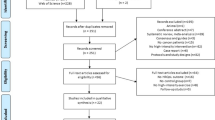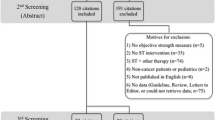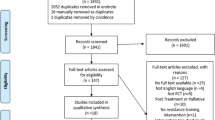Abstract
Purpose
The purpose of this study was to carry out a systematic review and meta-analysis to evaluate the effect of resistance training upon quality of life (QoL) in cancer.
Methods
Search strategy: A wide range of electronic databases were searched from inception to October 2009 using relevant key words. Reference lists of all studies identified for inclusion and relevant reviews were also searched. Relevant journals were hand searched and experts in the field contacted. Selection criteria: Randomized controlled trials that investigated the specific effect of resistance training on QoL in adult cancer survivors were included. Data collection and analysis: Two review authors independently assessed methodological quality and extracted data based upon predefined criteria. A meta-analysis was performed for QoL using a random effects model.
Results
Six studies were identified for inclusion. Two studies demonstrated a significantly beneficial effect of resistance training on QoL compared to usual care. Post-test means ± standard deviations were available for all comparisons providing data for 278 participants who received a resistance training intervention and 270 control participants. The results of the meta-analysis demonstrated that, at the end of the intervention period, resistance training was statistically more effective than the control intervention (SMD −0.17, 95% CIs −0.34 to −0.00). Overall, there was heterogeneity between studies in relation to tumor type, stage of cancer treatment, type of cancer treatment, and duration of the intervention.
Conclusions
Existing evidence suggests that strength training programs for cancer survivors have marginal benefit. Further, fully powered studies are required to determine the optimal type, intensity, and timing of resistance training.


Similar content being viewed by others
References
Al-Majid S, McCarthy DO (2001) Cancer-induced fatigue and skeletal muscle wasting: the role of exercise. Biol Res Nurs 2:186–197
Battaglini C, Bottaro M, Dennehy C, Barfoot D, Shields E, Kirk D, Hackney AC (2006) The effects of resistance training on muscular strength and fatigue levels in breast cancer patients. Rev Bras Med Esporte 12:139–144
Brown JK, Byers T, Doyle C, Courneya KS, Denmark-Wahnefried W, Kushi LH, Rock McTiernan A, CL AN, Cloch AB, Eldridge B, Hamilton K, Katzin C, Koonce A, Main J, Mobley C, Morra ME, Pierce MS, Sawyer KA (2003) Nutrition and physical activity during and after cancer treatments: an American Cancer Society guide for informed choice. CA Cancer J Clin 53:268–291
Courneya KS, Segal RJ, Mackey JR, Gelmon K, Reid RD, Friedenreich CM, Ladha AB, Proulx C, Vallance JKH, Lane K, Yasui Y, McKenzie DC (2007) Effects of aerobic and resistance exercise in breast cancer patients receiving adjuvant chemotherapy: a multicenter randomized controlled trial. J Clin Oncol 25:4396–4404
Cramp F, Daniel J (2008) Exercise for the management of cancer-related fatigue in adults. Cochrane Database Syst Rev 16(2):CD006145
Daley AJ, Crank H, Saxton JM, Mutrie N, Coleman R, Roalfe A (2007) Randomized trial of exercise therapy in women treated for breast cancer. J Clin Oncol 25:1713–1721
Dimeo FC, Fetscher S, Lange W, Mertelsmann R, Keul J (1997) Effects of aerobic exercise on the physical performance and incidence of treatment-related complications after high-dose chemotherapy. Blood 90:3390–3394
Dimeo F, Rumberger BG, Keul J (1998) Aerobic exercise as therapy for cancer fatigue. Med Sci Sports Exerc 30:475–478
Dimeo FC, Stieglitz RD, Novelli-Fischer U (1999) Effects of physical activity on the fatigue and psychologic status of cancer patients during chemotherapy. Cancer 85:2273–2277
Domholdt E (2000) Physical therapy research: principles and applications, 2nd edn. Saunders, Pennsylvania
Galvao DA, Nosaka K, Taaffe DR, Spry N, Kristjanson LJ, McGuigan MR, Suzuki K, Yamaya K, Newton RU (2006) Resistance training and reduction of treatment side effects in prostate cancer patients. Med Sci Sports Exerc 38:2045–2052
Graves S, Whitehurst M, Findley BW (2006) ACSM's resource manual for guidelines for exercise testing and prescription. Lippincott, Williams and Wilkins, Philadelphia
Guyatt GH, Sackett DL, Cook DJ (1993) Users' guide to the medical literature. II. How to use an article about therapy or prevention. J Am Med Assoc 270:2598–2601
Holick CN, Newcomb PA, Trentham-Dietz A, Titus-Ernstoff L, Bersch AJ, Stampfer MJ, Baron JA, Egan KM, Willett WC (2008) Physical activity and survival after diagnosis of invasive breast cancer. Cancer Epidemiol Biomark Prev 17:379–386
Holmes MD, Chen WY, Feskanich D, Kroenke CH, Colditz GA (2005) Physical activity and survival after breast cancer diagnosis. JAMA 293:2479–2486
Knols R, Aaronson NK, Uebelhart D, Fransen J, Aufdemkampe G (2005) Physical exercise in cancer patients during and after medical treatment: a systematic review of randomized and controlled trials. J Clin Oncol 23:3830–3841
Marín Caro MM, Laviano A, Pichard C (2007) Impact of nutrition on quality of life during cancer. Curr Opin Clin Nutr Metab Care 10:480–487
Markes M, Brockow T, Resch KL (2006) Exercise for women receiving adjuvant therapy for breast cancer. Cochrane Database Syst Rev 18(4):CD005001
McNeely ML, Parliament M, Courneya KS, Seikaly H, Jha N, Scrimger R, Hanson J (2004) A pilot study of a randomized controlled trial to evaluate the effects of progressive resistance exercise training on shoulder dysfunction caused by spinal accessory neurapraxia/neurectomy in head and neck cancer survivors. Head Neck 26:518–530
McNeely ML, Campbell KL, Rowe BH, Klassen TP, Mackey JR, Courneya KS (2006) Effects of exercise on breast cancer patients and survivors: a systematic review and meta-analysis. Can Med Assoc J 175:34–39
McNeely ML, Parliament MB, Seikaly H, Jha N, Magee DJ, Haykowsky MJ, Courneya KS (2008) Effect of exercise on upper extremity pain and dysfunction in head and neck cancer survivors: a randomized controlled trial. Cancer 113:214–222
Mock V, Hassey DK, Meares CJ, Grimm PM, Haisfield-Wolfe DJA, ME QW, Mitchell S, Chakravarthy A, Gage W (1997) Effects of exercise on fatigue, physical functioning, and emotional distress during radiation therapy for breast cancer. Oncol Nurs Forum 24:991–1000
National Comprehensive Cancer Network (2010) Clinical practice guidelines in oncology. Cancer-related fatigue version 1. Available at http://www.nccn.org. Accessed 1 March 2010
Ohira T, Schmitz KH, Ahmed RL, Yee D (2006) Effects of weight training on quality of life in recent breast cancer survivors. Cancer 106:2076–2083
Oldervoll LM, Kaasa S, Hjermstad MJ, Lund JA, Loge JH (2004) Physical exercise results in the improved subjective well-being of a few or is effective rehabilitation for all cancer patients? Eur J Cancer 40:951–962
Pinto BM, Maruyama NC (1999) Exercise in the rehabilitation of breast cancer survivors. Psychooncology 8:191–206
Powers SK, Howley ET (2006) Exercise physiology: theory and application to fitness and performance. McGraw Hill Higher Education, Sydney
Public Health Resource Unit (2006) Critical appraisal skills programme (CASP) learning and development. Available at http://www.phru.nhs.uk/Pages/PHD/resources.htm. Accessed 15 March 2009
Richardson MM, Babiak-Vazquez AE, Frenkel MA (2008) Music therapy in a comprehensive cancer center. J Soc Integr Oncol 6:76–81
Salmon PG, Swank AM (2002) Exercise-based disease management guidelines for individuals with cancer: potential applications in a high risk mid-southern state. J Exerc Physiol Online 5:1–10
Shapiro SH, Weijer C, Freedman B (2000) Reporting the study populations of clinical trials. Clear transmission or static on the line? J Clin Epidemiol 53:973–979
Schmitz KH, Ahmed RL, Hannan PJ, Yee D (2005) Safety and efficacy of weight training in recent breast cancer survivors to alter body composition, insulin, and insulin-like growth factor axis proteins. Cancer Epidemiol Biomark Prev 14:1672–1680
Schmitz KH, Holtzman J, Courneya KS, Masse LC, Duval S, Kane R (2005) Controlled physical activity trials in cancer survivors: a systematic review and meta-analysis. Cancer Epidemiol Biomark Prev 14:1588–1595
Schwartz AL, Mori M, Gao R (2001) Exercise reduces daily fatigue in women with breast cancer receiving chemotherapy. Med Sci Sports Exerc 33:718–723
Schwartz AL (2004) Physical activity after a cancer diagnosis: psychosocial outcomes. Cancer Investig 22:82–92
Segal RJ, Reid RD, Courneya KS, Malone SC, Parliament MB, Scott CG, Venner PM, Quinney HA, Jones LW, Slovinec D'Angelo ME, Wells GA (2003) Resistance exercise in men receiving androgen deprivation therapy for prostate cancer. J Clin Oncol 21:1653–1659
Segal RS, Reid RD, Courneya KS, Sigal RJ, Kenny GP, Prud'Homme DG, Malone SC, Wells GA, Scott CG, Slovinec D'Angelo ME (2009) Randomized controlled trial of resistance or aerobic exercise in men receiving radiation therapy for prostate cancer. J Clin Oncol 27:344–351
Segar ML, Katch VL, Roth RS, Garcia AW, Portner TI, Glickman SG, Haslanger S, Wilkins EG (1998) The effect of aerobic exercise on self esteem and depressive and anxiety symptoms among breast cancer survivors. Oncol Nurs Forum 25:107–113
Stanton AL (2006) Psychosocial concerns and interventions for cancer survivors. J Clin Oncol 24:5132–5137
Twycross R, Wilcock A (2001) Symptom management in advanced cancer. TJ International, Padstow
Wilkinson S, Barnes K, Storey L (2008) Massage for symptom relief in patients with cancer: systematic review. J Adv Nurs 63:430–439
Wilkinson S, Lockhart K, Gambles M, Storey L (2008) Reflexology for symptom relief in patients with cancer. Cancer Nurs 31:354–360
Wilmore JH, Costill DL (2005) Physiology of sport and exercise. Human Kinetics Europe, Leeds
Acknowledgement
We would like to thank the following individuals for their contributions to this review: Jennifer Campbell, Patrick Cookson, and Lauren Wee.
Author information
Authors and Affiliations
Corresponding author
Rights and permissions
About this article
Cite this article
Cramp, F., James, A. & Lambert, J. The effects of resistance training on quality of life in cancer: a systematic literature review and meta-analysis. Support Care Cancer 18, 1367–1376 (2010). https://doi.org/10.1007/s00520-010-0904-z
Received:
Accepted:
Published:
Issue Date:
DOI: https://doi.org/10.1007/s00520-010-0904-z




